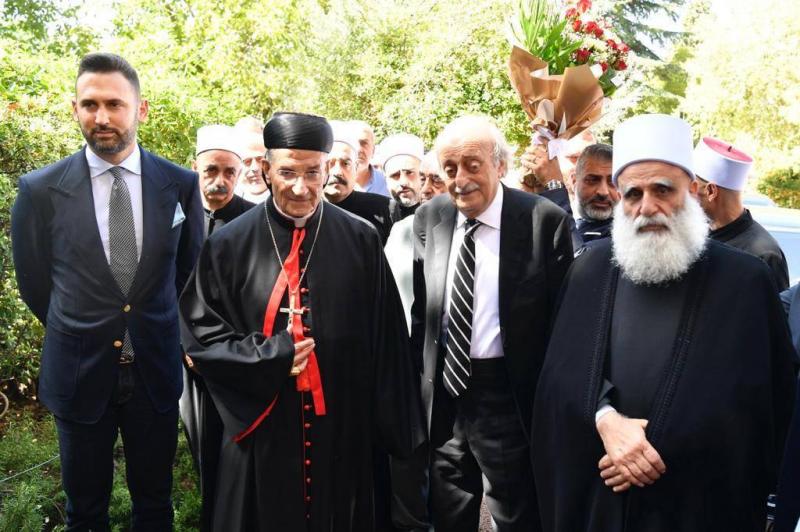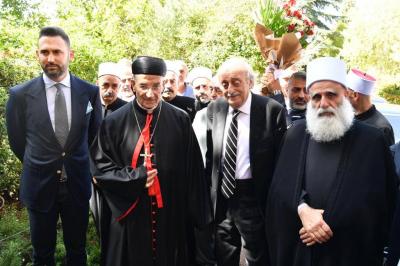The Druze leader Walid Jumblatt confirmed that "the reconciliation has been established despite the discordant voices here and there, which insist on digging up graves and forget the glorious pages of coexistence in the mountain and the homeland." During his meeting with Maronite Patriarch Bechara Boutros Al-Rahi and Sheikh of the Druze sect Samy Abi Al-Muna in Mukhtara, he addressed the attendees saying: "Your Beatitude, allow me to make some observations from a distant observer; first, we highly value all the local, Arab, and international efforts you are making to solve the presidential impasse, and we also commend your support for dialogue despite the multiple obstacles."
Jumblatt added: "In our literature, all martyrs are martyrs of the homeland without distinction from any party. Among the theories we hear, there is nothing more foolish or ridiculous, but more dangerous than those calling for a vacuum and not facilitating the presidential elections." He continued: "In another version of theories about what is called the president's specifications, it seems that it is required for the parliament to learn lessons in sculpture or sewing. When countries want to resolve issues, they resolve them. Remember the administration council days during the governorship, remember independence like in 1985, Taif, and other milestones; it is enough to put obstacles to obscure the elections."
In this context, he pointed out that "Iranian Foreign Minister Hossein Amir-Abdollahian is visiting concurrently with the visit of the 'demarcation' man Amos Hochstein, and both have stated their support for holding the presidential elections. Excellent, how? Can you demarcate the Baabda field, Mr. Hochstein, and can you facilitate the elections, Mr. Abdullahian? And what about the defining of the new sovereign fund with the concerned countries and local leaders? A question again from a distant observer."
Jumblatt concluded: "Once again, we highly appreciate your efforts, and we are ready for any important assistance for the difficult but not impossible presidential mission."
For his part, Al-Rahi affirmed that "this day is historic, and we came to revive once again the reconciliation you had with Patriarch Sfeir aimed at including all Lebanese. There is no reconciliation without confrontation." He pointed out that "Lebanon cannot continue in this state as it has become estranged from itself, and we still have not adopted national solutions and thus the issues are escalating," stressing that "Dar Mukhtara is historic." He addressed Jumblatt by saying: "You are the guardian of this history with your son, and we must carry this burden. We started this journey together and continue it hand in hand to work together for the unity of the homeland and its healing, and for reconciliation to encompass all of Lebanon."
Al-Rahi began his tour in the mountain this Friday morning by meeting with Sheikh Abi Al-Muna at his home in Shaniyeh, in the presence of various official, religious, political, and social figures. After welcoming him, Sheikh Abi Al-Muna stated: "Your presence conveys a message of love, brotherhood, and consolidation of reconciliation, symbolizing the reality of the unified mountain."
In turn, Patriarch Al-Rahi expressed to the Sheikh of the Druze: "In your heart lies the concern for Lebanese unity, and I express my joy and gratitude for this day that brings us together. Through this visit, I convey the bonds of love and friendship that unite us." Al-Rahi added: "We are a nation of meeting, dialogue, and openness, and this is what is called positive Lebanese neutrality. Lebanon cannot be a land of diversity and dialogue if it is not neutral; otherwise, it loses its message. From this gracious house, we aspire today to our true identity."
He stated: "Today, from this historic house, I say that Lebanon needs unity. Lebanon stands out in the Eastern environment as a unity in diversity, and this diversity is safeguarded by the constitution, and we must build internal unity."
Al-Rahi noted in a spontaneous reception in the town of Barouk that loyalty to the homeland is incomplete, stating in front of the National Anthem writer's monument: "We must all be for the homeland,” sharing the same faith with Sheikh Abi Al-Muna. From the National Library in Biaklein, Abi Al-Muna pointed out: "We meet with you with the presence of a national leadership that sponsors this beloved mountain and the elite of the nation in the premises of a prison turned into a library." He addressed Patriarch Al-Rahi, saying: "Your visit today is a blessed step, as it reaffirms the path of reconciliation and renews the joint action for the revival of the mountain and the aspirations of the nation amidst numerous challenges."
He added: "The historic reconciliation of the mountain was not just a signed understanding between a leader, a patriarch, and a sheikh along with witnesses; it was a covenant of wise men and heroic men. It was a pledge from heart to heart that says the mountain is its history, and history cannot be erased by one incident here or a confrontation there," questioning: "Why don’t we unite to strengthen hope for the future in light of the state's collapse? Doesn’t this require another kind of reconciliation? A reconciliation in the form of practical initiatives to build institutions and create productive projects... Shouldn’t we develop a strategic plan for advancement and rely on ourselves?"
Regarding the presidential entitlement, Abi Al-Muna emphasized that "dialogue is a means, not an end. So why don’t we call for it and participate in it to break through the wall of disruption, seeking the beauty of productive compromise?" For his part, Al-Rahi pointed out that "the foundation in Lebanon is unity in diversity. We jointly diagnose our problem and seek treatment for what we are suffering from, which is what we aspire to with the Sheikh and those of good will. We will not back down from this work because it is a national duty," adding, "The health of Lebanon is tied to the health of the mountain, and this is a shared responsibility that falls on all of us. The word reconciliation requires actions and initiatives, and we have a shared responsibility to work together for the unity of our people, and I will not back down from this."
Considered Al-Rahi, "Lebanon cannot continue its path without reconciliation and confrontation. We pray that reconciliation—confrontation at the political level—continues, and we seek God to empower everyone to do so courageously." In his sermon during the Mass of the Feast of Our Lady of Salvation at the courtyard of the Bishopric in Beit Eddine in Chouf, he remarked, "This is a thank-offering to God for this beautiful day, where we lived the beauty of reconciliation that took place in the mountain in 2001."
He observed that "Lebanon cannot continue its path without reconciliation and confrontation. We pray that reconciliation-confrontation at the political level continues, and we seek God to empower everyone to do so courageously." He remarked: "The beginning was in Shanaye with the Sheikh of the Druze sect Samy Abi Al-Muna, and the goal was to renew the bonds of love, friendship, and cooperation in serving together on a spiritual level. Then we paid homage in Barouk to our people there and had a moment at this episcopate."
He continued: "Then we visited Biaklein, where Abi Al-Muna and I spoke about the fruits of the historic reconciliation carried out by the late Maronite Patriarch Nasrallah Boutros Sfeir and former MP Walid Jumblatt, to affirm our commitment to continue this historic reconciliation, as it is based on the unity of our people and the unity of our politicians in the nation's journey."
After that, we moved to Dar Mukhtara, shared the food of love, and exchanged words with Jumblatt. And now we are here to thank God for this beautiful day and extend greetings to all who accompanied us, emphasizing that "we thank the Lord for these blessings, renew our faith in the path of reconciliation, and pray that reconciliation encompasses all politicians, parties, and responsible groups so that the homeland may remain safe."
He believed that "Lebanon cannot continue its path without reconciliation and confrontation. We pray that reconciliation-confrontation continues at the political level, and we seek God to empower everyone to do so courageously."




